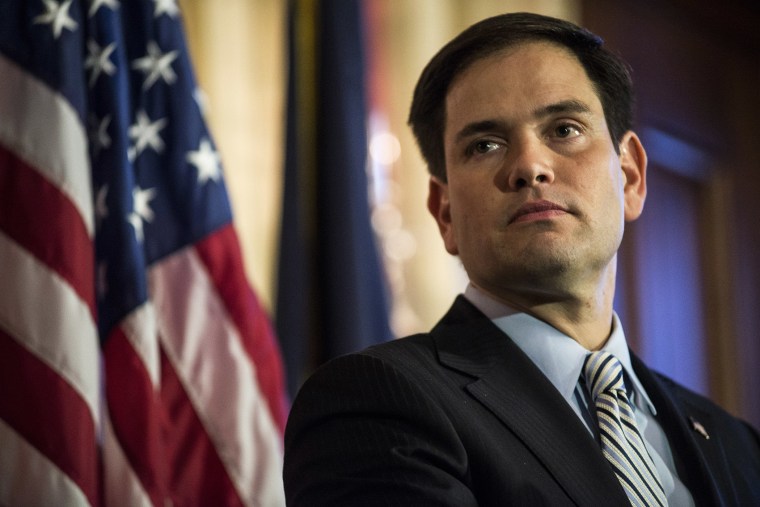The politics of "nation-building" have been tricky for Republicans in recent years. In 2000, then-Gov. George W. Bush denounced the very idea as an inappropriate use of U.S. resources, telling voters in a presidential debate, "I'm not so sure the role of the United States is to go around the world and say, 'This is the way it's got to be.'"
After launching two wars in the Middle East, the Republican discovered how much he loved nation-building after all.
But at least with Bush, there were a couple of years in between his contradictory positions. Today on Fox News, Sen. Marco Rubio (R-Fla.), in describing his approach to U.S. policy towards Iraq, seemed to support and oppose nation-building at the same time (via Hunter Walker).
RUBIO: "[T]he most immediate responsibility we have [towards Iraq] is to help them build a functional government that can actually meet the needs of the people in the short- and long-term. And then ultimately, from that, we can hope it would spring a democracy... FOX: "That sounds like nation-building. So you're saying..." RUBIO: "Well, it's not nation-building. We are assisting them in building their nation."
Well, that clears things up nicely, doesn't it? Rubio isn't on board with nation-building, so much as he supports the United States using its resources to help build nations. Got it.
Also, though Rubio neglected to mention it, the United States has already gone to great lengths -- after invading Iraq under false pretenses and destroying many of its public institutions -- to "help them build a functional government." The Florida Republican made it sound as if his approach is a novel idea, but let's be clear: the U.S. role in cultivating a responsive and responsible Iraqi government has been ongoing for a quite a while.
But just as important from an electoral perspective, this is just the latest in a series of instances in which Rubio has struggled to talk about Iraq -- and foreign policy in general.
For example, Rubio has contradicted himself on whether he would have launched an invasion of Iraq in the first place, and when pressed, the senator was reduced to, "I don't understand the question."
What's more, the larger problem for Rubio is that he's basing his national campaign on international affairs, despite the fact that he's routinely incoherent on the subject. Making matters worse, the Floridian's troubles seem to be getting worse, not better.
And when he does try to articulate a substantive vision, Rubio tends to rely a little too heavily on shallow, bumper-sticker-style sloganeering, rather than actual policy measures. As we recently discussed, Rubio declared “our strategy” on national security should mirror Liam Neeson’s catchphrase in the film “Taken”: “We will look for you, we will find you and we will kill you.”
Soon after, the candidate’s team unveiled the “Rubio Doctrine,” described by Charles Pierce as “three banalities strung together in such a way as to sound profound and to say nothing.”
Two weeks ago, the Floridian insisted, "Nothing matters if we aren’t safe," which is both bizarre and wrong, only to add, "[T]he world has never been more dangerous than it is today," which is absurd.
If a national campaign for the White House were an elaborate test to identify which candidate is best as sloganeering, Rubio would have an excellent chance at success. But there is -- or at least should be -- a little more to it.
There's still time for Rubio to pick a new signature issue. Foreign policy doesn't seem to be working out for him.
